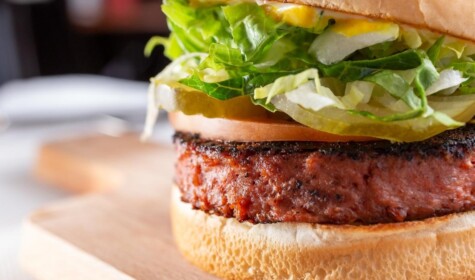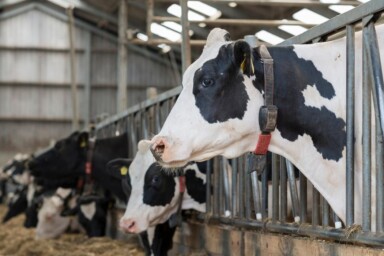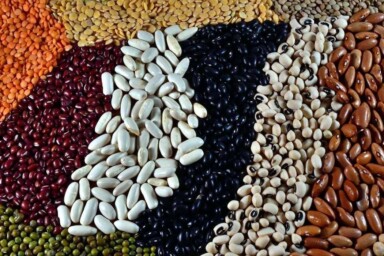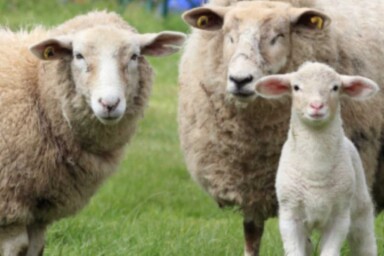The Impossible Burger is arguably the perfect veggie analog to the ubiquitous beef burger and it is making a big splash as the veggie burger that ‘bleeds’. Joanna Blythman, a renowned investigator of the unpronounceable ingredients in processed food, has a look at the newest fake meat arrival.
The ‘Impossible Burger’ is being marketed in the US as the revolutionary product that will make meat redundant. Its ingredients are as follows: water, textured wheat protein, coconut oil, potato protein, natural flavors, leghemoglobin (soy), yeast extract, salt, soy protein isolate, konjac gum, xanthan gum, vitamins and zinc.
Now even for me, a seasoned investigator of obscure techno-ingredients, this list requires annotation. Let’s start with its first ingredient by weight: water. Suffice it to say that no quality product uses it as a bulk ingredient. Textured wheat protein, potato protein and soya protein isolate are all powdery derivatives, extracted from their eponymous food using hi-tech chemical and physical methods that are veiled in commercial secrecy. Coconut oil has a trendy ‘superfood’ ring to it, except that here it isn’t raw, so the inherent nutrition of the nut has been heavily compromised by the harsh industrial refining process to which it has been subjected. Konjac and xanthan are industrial hydrocolloid gums. (The latter was designed to thicken the drilling mud in the oil industry.) Their role here is to absorb all that water and glue together ingredients that wouldn’t naturally bond.
Then we come to the flavourings. My research has left me unconvinced that any man-made flavourings merit the epithet ‘natural’. The procedures for creating supposedly ‘natural’ flavourings do begin with real ingredients, but by law, the final miracle substance can be obtained ‘by appropriate physical, enzymatic, or microbiological processes’, including advanced fermentation techniques that involve genetic modification (GM). Companies use man-made flavourings to replace true flavours that have been destroyed by the rigours of the manufacturing process, and also to mask unpleasant flavours. Soy protein isolate, for example, has a bitter taste.
Yeast extract and salt have long been used to improve the lamentable taste profile of ‘vegetarian meats’. The former lends a savoury umami character that crudely apes the intrinsic taste of browned meat; the latter simply distracts from overall lack of flavour. While a health-enhancing spectrum of vitamins naturally occurs in real beef, this product is ‘fortified‘ with the synthetic versions that are added to nutrient-light breakfast cereals to make them seem healthier than they really are.
And what of the most arcane ingredient in this faux meat? Soy leghemoglobin (SLH) is a vat-grown, genetically engineered form of the heme iron found in the root nodules of soybean plants. We’re told that it gives the fake meat a ‘bloody’, meat-like taste and colour. It has emerged that the US Food and Drug Administration’s view is that “the current arguments at hand, individually and collectively, were not enough to establish the safety of SLH for consumption”.
So that’s the Impossible Burger: water, protein powders, glues, factory flavourings, flavour enhancers, synthetic vitamins – all signifiers of low-grade, ultra-processed food – and a novel ingredient that has no proven track record of safety.
Reading this list of ingredients, it’s not the sort of product that I, and many other food-aware citizens, would buy. It’s the very antithesis of local food with a transparent provenance and backstory. I’d have absolutely no chance of tracing the origins or uncovering any substantive detail on the assiduously guarded production methods behind its utterly anonymous components.
And although the sales pitch for the Impossible burger is that it’s ‘made from simple, all-natural ingredients’, it’s patently the brainchild of a technocratic mindset, one brought to us by food engineers and scientists whose natural environment is the laboratory and the factory – not the kitchen, farm or field – and people who believe that everything nature can do, man can do so much better, and more profitably.
In many ways, this novel burger reminds me of margarine, which is a forced marriage of two cheap substances: oil that’s been refined out of all recognition and water, brokered by emulsifying additives, tarted up with colour (to hide its grey appearance) and the customary added vitamins to give it an aura of health. The only reason people countenanced eating this confected amalgam was that they were (wrongly) informed that it was better for them than butter. Now people see behind the hype. Sales of margarine and spreads have stalled; butter sales are buoyant. Might the ‘plant meat’ wonder attain the same failed status in time?
Of course, the Impossible burger has an infinitely more ambitious sales pitch than margarine. Apparently, this plant food breakthrough is going to feed the world benignly ‘without the destructive impact of livestock’, a fairy-wand environmental promise that blinds some people to its blatant shortcomings.
Synthetic, imposter, faux, fake – however you like to describe it – ‘plant meat’ is the latest future food gold rush for billionaires, backed by the likes of Bill Gates and Richard Branson. Not so long ago, Silicon Valley was humming with the buzz around insect protein. Man-made, ‘no-kill’, ‘real’ lab meat had been the new frontier for a while, but to date it has proved too slow and expensive to produce, and because such techniques rely on stem cells from live animals or butchered meat to start the process, it didn’t play well with vegans and vegetarians.
Now with the advent of the Impossible burger, the plant meat mega-bus is up and running, with some vegans and environmentalists queuing to get on board. Recently, the journalist George Monbiot, who in the past wavered between supporting veganism and sustainably produced meat, celebrated the advent of cheap, artificial meat. He denounced all livestock farming, including extensive, non-factory, organic, production – even keeping a few hens I suppose – as being as backward-thinking, cruel, and as morally wrong as “the subjugation of women, judicial torture, the murder of heretics, imperial conquest and genocide, the first world war and the rise of fascism”. Short of name checking Hitler, it’s hard to imagine a more choleric and polarising stance.
I have tried to reason with Monbiot on Twitter. I challenged him to adopt a more nuanced, less absolutist approach that, as a bare minimum, drew a qualitative distinction between intensive factory farming (an undisputed abomination), and the myriad of small-scale, geographically appropriate, agro-ecological, pasture-based livestock systems that exist in this world. Before condemning all livestock production finally and irrevocably, I urged Monbiot to take up his standing invitation from David Finlay, who has offered to show him around his dairy farm in Galloway, which incorporates agroecology, agroforestry and calf-at-foot dairying. But Monbiot was having none of it, “People prefer charming myths to brutal truths,” he replied. And although he acknowledged that there are lesser degrees of evil, as he sees it, all livestock farming, without exception, is irredeemably brutal.
Here I think we get to the nub of a crucial debate that demands honesty. Vegans and vegetarians believe that it’s cruel and wrong to kill animals for food. Omnivorism is, in their terms, intrinsically brutal. The vegan movement has traditionally seen the cessation of animal slaughter as a paramount goal that trumps all other considerations: taste, tradition, food quality and the role of ruminants in building soil fertility. In this recent attack of livestock farming, Monbiot said: “Quorn [a meat protein substitute made from fermented fungus] seems almost indistinguishable from chicken or mince to me.” This statement surprises me – the texture and taste is quite different in my opinion – but it flags up for me a studied obliviousness to the organoleptic characteristics, quality and composition of food that must surely be driven by an over-arching, ideological sentiment.
Many vegans and vegetarians deploy environmental arguments to lend weight to their philosophical stance, but it is the issue of slaughter that first puts the fire in their bellies. A case in point is the vegan propaganda films streamed from the US, Cowspiracy and What the Health? These scare and disgust people because they use worst case US scenarios of animal cruelty, and its potential detrimental effects on human health, as a broad-brush smear against all livestock production everywhere. Viewers in the UK who are not well informed about farming methods don’t know, for instance, that there are no US-style feedlots in the UK (or Europe), nor do they appreciate that the growth hormones that push cows beyond metabolic limits to produce high volumes of milk in the US, are banned both in the UK and EU.
For my part, I’m an omnivore. I am prepared to use and to kill animals to provide high quality food for humans, provided that those animals have been well-treated throughout their lives and competently, that is humanely, slaughtered. I have absolutely no truck with factory farming, but have great respect for the varied, well-adapted, traditional livestock farming systems on this planet that have sustained humans down the centuries. After all, they constitute the longest running diet experiments in history. I won’t reiterate or re-argue here all the environmental arguments for sustainable mixed farming, only reference the fact that they have been amply documented by Richard Young at the Sustainable Food Trust, and other informed commentators.
I’m also awed by nature’s complex systems that gift us humans the privilege of nutritionally perfect, health-giving natural foods, be they eggs, milk, meat, cereals, or fruit and vegetables. Cutting-edge food engineers who create ‘plant meat’ are undeniably clever, but they do not have nature’s sure nutritional judgment, good taste, and wise, all-seeing intelligence, or fully understand how her elaborate natural systems work.
It’s a great pity that the vegan versus omnivore debate has become so heated and binary. The equation that plant food is good and animal food is bad, is simplistic at best. Those who rush to embrace the ‘plant meat’ revolution as our environmental and ethical salvation, fail to interrogate the product in any deeper way, and that’s a significant blind spot in evaluating its ultimate sustainability and moral rightness.







